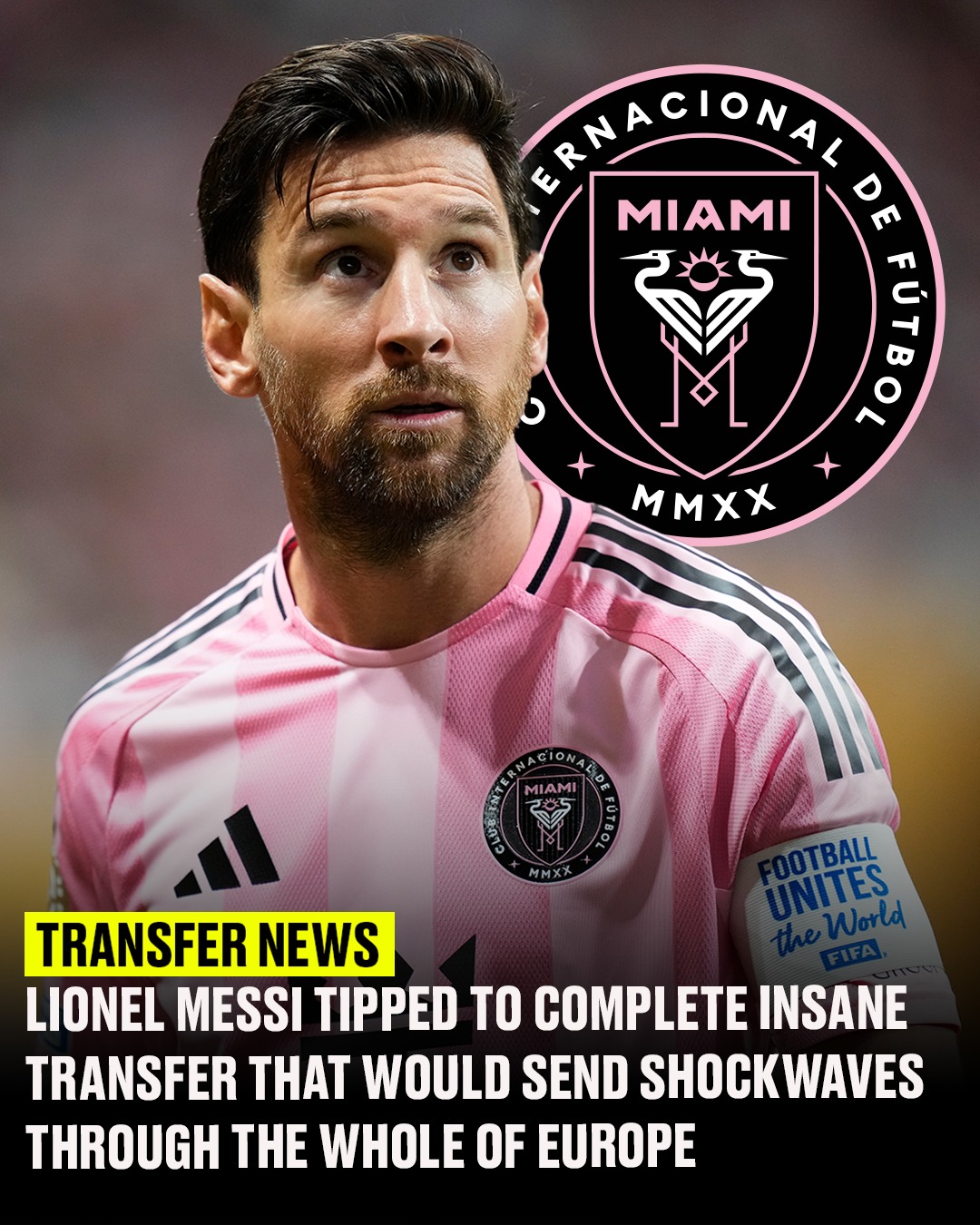Lionel Messi tipped to complete insane transfer that would send shockwaves through the whole of Europe

In the ever-evolving landscape of modern football, few names carry the weight and transformative power of Lionel Messi. As the Argentine maestro continues his journey with Inter Miami in Major League Soccer, speculation about his future remains a constant source of fascination for fans and pundits alike. Recent discussions have centered around a potential move that could send shockwaves through European football: a transfer to Arsenal that could finally deliver the Premier League title that has eluded the North London club since 2004.
The suggestion, while seemingly far-fetched given Messi’s current contractual obligations, has gained traction among football analysts who believe the eight-time Ballon d’Or winner possesses the unique combination of skill, experience, and winning mentality to transform Arsenal’s fortunes. This isn’t merely wishful thinking from desperate Gunners fans; it’s a calculated assessment of what one of football’s greatest players could bring to a team that has consistently fallen just short of Premier League glory in recent years.
Andy Goldstein, the prominent talkSPORT host, has been particularly vocal about this possibility, arguing that Messi’s arrival at the Emirates Stadium would be the missing piece in Arsenal’s championship puzzle. “You know what, I think if he plays up front for Arsenal, he wins them the Premier League,” Goldstein stated with conviction. “I genuinely do. If you’ve got Messi scoring goals, I think he wins them [the title]. Where’s their weakness, Arsenal? It’s probably the lack of a No.9.”
This assessment touches on one of Arsenal’s most persistent challenges under manager Mikel Arteta. Despite significant investment in the squad and impressive tactical evolution, the Gunners have struggled to find a consistent, world-class striker who can deliver in the biggest moments. While players like Kai Havertz have shown flashes of brilliance, the consensus among critics and fans is that Arsenal lacks the clinical edge required to get over the line in title races.
The Premier League That Never Was
Messi’s relationship with English football is one of unfulfilled potential and missed opportunities. Throughout his illustrious career, the Argentine has never played in what many consider the world’s most competitive domestic league, despite numerous links with Premier League giants over the years. Before his controversial departure from Barcelona and subsequent move to Paris Saint-Germain in 2021, Messi was heavily linked with several English clubs, including Manchester City and Chelsea.
The summer of 2021 represented perhaps the closest Messi came to gracing the Premier League. As his Barcelona contract situation became increasingly untenable due to the club’s financial constraints, Manchester City emerged as serious contenders for his signature. The prospect of reuniting with Pep Guardiola, under whom Messi had enjoyed some of his most successful years at Barcelona, seemed like a natural fit. The tactical understanding between player and manager, combined with City’s financial resources and championship ambitions, created what appeared to be the perfect storm for a Premier League move.
However, PSG’s late intervention, offering astronomical wages and the promise of Champions League glory alongside fellow superstars Neymar and Kylian Mbappé, ultimately swayed Messi’s decision. The move to Paris was seen by many as a safe option—a chance to continue playing at the highest level while maintaining his astronomical earnings without the physical and tactical demands that might come with adapting to Premier League football.
Jason Cundy, another prominent voice in football media, expressed the disappointment many felt about Messi’s choice to join PSG rather than test himself in England. “It was so right for that particular little portal for him to come to the most watched league in the world. He went to PSG. Bore off,” Cundy lamented, capturing the sentiment of many who felt Messi had missed a golden opportunity to prove himself in English football.
The Historical Precedent: Messi vs. English Opposition
While Messi may never have played regularly in the Premier League, his encounters with English clubs throughout his career provide compelling evidence of his potential impact in the division. The statistics paint a picture of a player who has consistently thrived against Premier League opposition, even when facing them on neutral or away territory in European competitions.
Across 36 matches against the Premier League’s traditional ‘Big Six’—Arsenal, Chelsea, Liverpool, Manchester City, Manchester United, and Tottenham—Messi’s record is nothing short of extraordinary. With 27 goals and six assists in these encounters, he has demonstrated an ability to rise to the occasion against English opposition that few players in football history can match.
Arsenal, ironically, have been on the receiving end of some of Messi’s most memorable performances. During Barcelona’s golden era under Pep Guardiola, the Gunners faced the Catalan giants multiple times in the Champions League, with Messi consistently proving to be their nemesis. His ability to find space in Arsenal’s defensive structure, his clinical finishing, and his capacity to create opportunities for teammates showcased exactly the kind of qualities that Arsenal have been missing in their recent title challenges.
Manchester United, too, have painful memories of Messi’s brilliance. The 2009 and 2011 Champions League finals saw Messi instrumental in Barcelona’s victories over the Red Devils, with his performances in those matches cementing his status as one of the game’s all-time greats. These displays demonstrated not just his individual brilliance but his ability to perform in the highest-pressure situations—exactly the kind of mentality Arsenal need to finally get over the line in title races.
The Napkin That Started It All
To understand the magnitude of what a Messi transfer would represent, it’s essential to revisit the humble beginnings of his professional career. The story of Messi’s first Barcelona contract, famously written on a napkin, has become one of football’s most enduring legends—a tale that perfectly encapsulates the blend of talent, opportunity, and decisive action that has defined his career.
In December 2000, a 13-year-old Messi traveled from his hometown of Rosario, Argentina, to Barcelona for what would prove to be the most consequential trial in football history. The young Argentine was relatively unknown outside of his local circles, but his talent was evident to anyone who watched him play. However, his path to Barcelona wasn’t straightforward. Messi suffered from a growth hormone deficiency that required expensive treatment, and his age made him ineligible for many youth programs.
The trial at La Masia, Barcelona’s legendary youth academy, was meant to be Messi’s chance to prove himself worthy of investment. What transpired during those few days would change not just Messi’s life but the entire trajectory of Barcelona as a football club. His performances were so impressive that Barcelona’s technical director at the time, Carles Rexach, knew he couldn’t let bureaucratic procedures and negotiations delay the signing.
In a moment that has become football folklore, Rexach grabbed a napkin at a Barcelona restaurant and hastily wrote out the terms of Messi’s first professional contract. This wasn’t just any napkin—it was the document that would bind one of football’s greatest talents to what would become his spiritual home for the next two decades. The napkin contract included provisions for Barcelona to cover Messi’s medical treatment costs, effectively removing the primary obstacle to his signing.
This story resonates particularly strongly when considering a potential Arsenal move because it demonstrates the kind of decisive action and vision required to secure transformational talent. Just as Rexach recognized that Messi couldn’t be allowed to slip away, Arsenal’s hierarchy would need to show similar conviction and creativity to make such a signing happen.
The Modern Context: Inter Miami and MLS
Messi’s current situation at Inter Miami presents both opportunities and challenges for any potential suitor. His move to Major League Soccer in 2023 was seen by many as the beginning of the twilight phase of his career—a chance to enjoy football in a less demanding environment while building his brand in the American market. However, his performances for both club and country have demonstrated that reports of his decline have been greatly exaggerated.
At Inter Miami, Messi has shown flashes of the brilliance that made him a global icon. His ability to influence matches, create opportunities, and score crucial goals remains largely intact, even as he approaches his late thirties. The question for potential suitors isn’t whether Messi can still perform at the highest level—his continued excellence for Argentina, including their World Cup triumph in 2022, provides ample evidence of his enduring quality.
The more pertinent question is whether Messi would be willing to return to the demands of European football. The Premier League, in particular, represents a significant step up in intensity from MLS. The pace of the game, the physicality of the opposition, and the relentless fixture schedule would all present challenges for a player in the latter stages of his career.
However, these concerns may be overstated. Messi’s game has never been built purely on pace or physicality. His football intelligence, technical ability, and understanding of the game have, if anything, improved with age. These are exactly the qualities that could thrive in the Premier League, where tactical sophistication and mental sharpness are increasingly valued over pure athleticism.
Arsenal’s Strategic Need
Arsenal’s interest in a player of Messi’s caliber isn’t just about star power—it addresses a genuine tactical need that has prevented them from achieving their ultimate goal. Under Mikel Arteta, Arsenal have developed into one of the Premier League’s most cohesive and tactically sophisticated teams. Their defensive structure is solid, their midfield is creative and energetic, and their wide players offer pace and directness.
The missing piece, as many observers have noted, is a clinical finisher who can convert the chances that Arsenal create. The team’s xG (expected goals) data consistently shows that they generate enough opportunities to score more goals than they actually do. This inefficiency in front of goal has cost them dearly in title races, where the margins between success and failure are incredibly small.
Kai Havertz, despite his undoubted talent, hasn’t consistently provided the goal threat that Arsenal need from their central striker. His movement and link-up play are excellent, but his conversion rate and ability to score in crucial moments remain question marks. Gabriel Jesus, when fit, offers more natural goalscoring instincts but has struggled with injuries and consistency.
Messi, even at this stage of his career, represents a different level of finishing ability. His career conversion rate, his ability to score from seemingly impossible positions, and his track record in high-pressure situations make him an obvious upgrade on Arsenal’s current options. Beyond his goalscoring, Messi’s playmaking ability would add another dimension to Arsenal’s attack, creating opportunities for the likes of Bukayo Saka, Gabriel Martinelli, and Martin Ødegaard.
The Financial and Practical Realities
Of course, the prospect of Messi joining Arsenal isn’t just about football considerations—the financial and practical aspects of such a move would be enormously complex. Messi’s current contract with Inter Miami, which runs until the end of 2025, includes clauses and commitments that would make any European move challenging to orchestrate.
The financial package that convinced Messi to join Inter Miami was reportedly one of the most lucrative in sports history, including not just his salary but also revenue-sharing agreements with Apple (MLS’s broadcast partner) and Adidas. Any club looking to tempt him back to Europe would need to match or exceed these terms, which would represent an enormous financial commitment.
For Arsenal, such an investment would be unprecedented. While the club has shown increased ambition in the transfer market in recent years, a move for Messi would dwarf any previous signing. The wages alone would likely make him the highest-paid player in Premier League history, and that’s before considering transfer fees, agent commissions, and the various add-ons that such a deal would inevitably include.
However, the potential return on investment could justify such an outlay. Messi’s global appeal would significantly enhance Arsenal’s commercial value, potentially opening up new revenue streams and sponsorship opportunities. The merchandise sales, increased ticket demand, and global media attention would all contribute to the club’s bottom line.
The Legacy Question
Perhaps the most compelling argument for a Messi move to Arsenal—or indeed any Premier League club—is the legacy factor. Despite his incredible achievements, there remains a sense that Messi’s career would be incomplete without testing himself in English football. The Premier League’s reputation as the world’s most competitive domestic league means that success there carries particular weight in discussions of all-time greatness.
For Arsenal, signing Messi would represent the ultimate statement of intent. It would signal to their rivals, their fans, and the wider football world that they are serious about returning to the summit of English football. The psychological impact of such a signing shouldn’t be underestimated—both on Arsenal’s own players and on their competitors.
The presence of Messi in training, in the dressing room, and on the pitch would elevate everyone around him. Young players like Saka and Martinelli would benefit enormously from working alongside one of the game’s greatest ever players. Experienced squad members would be inspired by Messi’s professionalism and winning mentality.
Conclusion: A Dream Worth Pursuing
While the practical obstacles to a Messi-Arsenal union are significant, the potential rewards make it a dream worth pursuing. Football history is full of seemingly impossible transfers that came to fruition through vision, determination, and a willingness to think outside conventional boundaries.
The napkin that started Messi’s Barcelona career serves as a reminder that sometimes the most important decisions in football are made not in boardrooms or through agents, but in moments of inspiration when someone recognizes an opportunity that cannot be missed. If Arsenal truly believe that Messi could be the difference between continued near-misses and actual success, then they owe it to themselves and their fans to explore every possible avenue.
The ticking clock of Messi’s career adds urgency to any such pursuit. Football waits for no one, and the window for bringing one of the game’s greatest players to the Premier League is rapidly closing. For Arsenal, the question isn’t just whether they can afford to try to sign Messi—it’s whether they can afford not to try.
In a sport where margins are increasingly fine and the difference between success and failure can be measured in individual moments of brilliance, the presence of a player like Messi could be transformational. From a napkin in a Barcelona restaurant to potential glory at the Emirates Stadium, Messi’s story continues to evolve. The next chapter may yet be written in North London.















